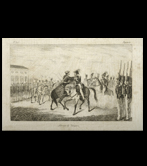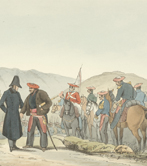19th century: The Carlist Uprisings
These civil wars were the military reflection in Spain of an ideological clash between liberals and traditionalists which took place all over Europe. The first Carlist uprising had its roots in a succession dispute: when Fernando VII died in 1833, his daughter (supported by the liberals) succeeded to the throne as Isabella II, while her brother was proclaimed Charles V and took up the standard of tradition and religion.
Tomás de Zumalacárregui assumed command of the Basque Carlists and forced Isabella’s army to take refuge in the Basque capitals. These were always held in liberal hands, while most of the territory was under Carlist controlfor almost three years. In 1839 the dispute was resolved by the Convention of Bergara: Isabella was accepted as queen and she agreed to respect the Fueros (Charters).
The overthrow of Isabella II in 1868 and the proclamation of the First Spanish Republic brought about a military reaction from the Carlists and some conservative liberals. The attempt to install Don Carlos ended in military defeat and the abolition of the Fueros in 1876.



